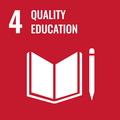4- Quality Education

Here are the actions taken by the Université de Montréal to offer an education of the highest quality to its community, within and beyond campus.
Student Educators Program
Student volunteers known as Réseau écoambassadeur raise awareness related to sustainability issues within their community. They are active members of a wider network of people concerned by these topics and willing to be carriers of solutions. These ambassadors become sort of liaisons between the central actors of sustainable development on campus and the university community at large. They often address the problems they encounter and share them with central players. All students on campus can participate in the program.
Number of trained student educators : 10
Number of weeks the student educators program is active annually : 52
Average or expected number of hours worked weekly per trained student educator : 1
Total number of hours worked annually by trained student educators : 700
Number of students enrolled for credit and served by a peer-to-peer sustainability outreach and education program : 47,125 (percentage: 100%)
For more information: https://ecoudem.wordpress.com/author/ecoudem/
Open Access to Research
Papyrus, the University’s institutional repository, was launched in 2005 and hosts theses and dissertations from students as well as publications from faculty.
Link to Papyrus : https://papyrus.bib.umontreal.ca/xmlui/?locale-attribute=en
The University also manages Érudit, an inter-university consortium in Quebec whose main mission is to disseminate and promote the results of scholarly research, mainly in the humanities and the social sciences. The platform makes available the content of more than 200 scholarly journals.
Link to Érudit : www.erudit.org/en/
Educational Outreach Activities
The Université de Montréal builds educational bridges with the community through a variety of projects. For example, Cap Campus is a project in which university students visit local high schools and colleges and encourage young students to pursue a university degree. The interactions take the form of programmed and ad hoc lectures and workshops.
For more information : https://capcampus.umontreal.ca/accueil/